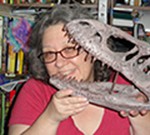Award-winning nonfiction author Kelly Milner Halls uses memories from her childhood to write books for young readers. “The freedom I had to explore miles of undeveloped wooded acres and everything that thrived in those woods gave birth to every book I’ve ever written,” she says. Her experiences between the ages of nine and twelve were “the happiest, most joyful, discovery ridden” of her life.
She recalls gathering what she thought was an abandoned spider egg, placing it in a jelly jar with holes punched in the metal lid, and waiting for it to hatch. Every day, Halls watched and waited. “One day when I was all but convinced it would never hatch, I saw something move from inside the egg.” To her surprise, the egg yielded a single lizard rather than dozens of spiders. “I got to watch it take its first breath of air, its first steps inside the jar. I watched it scamper away when I set it free where I’d found it months before…I remember the wonder I felt, the magic—like it was yesterday.”
Although Halls was a reader, she thought fiction was boring and too much work. Until her teacher read Charlotte’s Web aloud. “Fern was so much like me, I thought the writer knew me,” Halls says. “And that connection convinced me fiction had a value.” Up until that time, biographies of Abraham Lincoln were her favorite books. “I almost never found books that appealed to me as a kid,” she says. Today, her passion for natural history, the weird, the supernatural, and the unexplainable permeates her books for children. “I write the books I would have loved as a child.”
For example, when Halls was young a friend sent her a postcard with a picture of a mummy on the front. “It gave me nightmares,” she says, “but it also made me terribly curious. Who was that dead guy? How did he die? Did he have a name? No one could answer my questions.” As an adult, Halls finally had the power to locate experts to answer her questions. Mysteries of the Mummy Kids attempts to dispel a child’s fear about mummies with the facts. “Once you have answers, fear evaporates,” she says.
After writing Wild Dogs, a book that explores dogs from various continents, Halls turned her attention to Wild Horses. At the time, the U.S. was at war with Iraq and Halls was conducting research on wild horses of the Middle East. She read an article about a U.S soldier named Major William Sumner assigned to save deposed dictator Saddam Hussein’s Arabian stallions. Although the horses were not wild, they were as close to the wild Arabian bloodline as she could get. She emailed the soldier and interviewed him for her book. Major Sumner’s chance comment that horses were not the only animals he rescued planted the seed for Halls’ next book. After the bombing of Baghdad, only 40 starving emaciated animals remained out of a collection of 600 at the Baghdad Zoo. Saving the Baghdad Zoo credits Major Sumner, the Iraqi people, and several organizations for an enduring symbol of hope and peace.
The research process for each of Halls’ books lasts anywhere from three to five years. “Enormous amounts of research are necessary,” she says, “in part because the topics are somewhat unusual. There were no books about albinism when I wrote Albino Animals, apart from text book and medical materials.” Halls frequently interviews experts and attends professional conferences on her book’s topic. Before writing the manuscript, she creates a proposal and writes a sample chapter, which she submits to a group of carefully targeted editors.
According to Halls, the biggest misconception about writing for children is that it is easier than writing for adults. “Untrue,” she says. “It’s much harder. I know because I’ve done both. Writing for kids is far more intense because you have to do the same research you would for grown-ups, then bring it into focus for a younger reader, developmentally speaking. You have to bring some very sophisticated ideas and processes into clear view for kids who have never even imagined them before.” In a funny research twist, Halls set out to prove that Sasquatch was not real when embarking on In Search of Sasquatch. “I slowly evolved to thinking I was wrong,” she says. “Sasquatch surprised me and that’s hard to do.”
Halls admits that she craves approval for her writing, but not in the form of traditional awards and reviews. “They are nice,” she says, “but I crave the approval of the kids for whom I write. Knowing they love [my] books is the best form of prestige. They are the reason I write.”
Whether Halls speaks to students or a group of writers, she always advises her audience to embrace their inner weirdness. “My career began to soar the minute I embraced the person I really was,” Halls says. “No more wishing I was like another writer. No more wishing I could write something else. The minute I began to love the work I was good at, that work rewarded me. I hope that will help other writers search for authenticity in themselves, too.”


